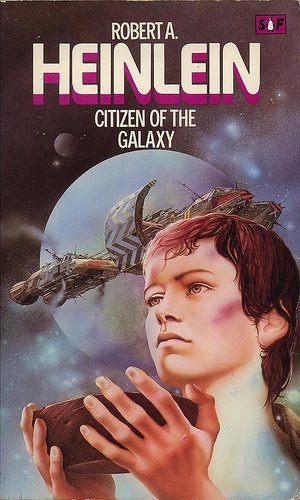
Considered to be one of the greatest science fiction writers in history, and often called the dean of science fiction writers, Robert Heinlein is one of the most influential writers in the entire history of the genre. Often, he is ranked as one of the giants of science fiction, along with Isaac Asimov and Arthur C. Clarke.
Born on July 7, 1907 in Butler, Missouri, he spent his childhood in Kansas City where the values of the time and place in the Bible Belt, had a large impact on his writing. His writing would draw heavily on his childhood. His time with the U.S. Navy also had a huge impact on his life and his writing. He graduated from the U.S. Naval Academy in Maryland with a degree in naval engineering. Assigned to the USS Lexington, he worked in radio communications. He served under Captain Ernest J. King, who would become the Commander-in-Chief of the U.S. Fleet during the Second World War. He also served on the USS Roper, earning the rank of Lt.
In 1929, he married Elinor Curry and divorced her one year later. In 1932, he married Leslyn MacDonald, who he was married to for 15 years.
Discharged from the army in 1934, he began to take classes in mathematics and physics but soon quit. He would publish his first story, Life-Line, in the August 1939 issue of Astounding Science-Fiction. In 1947, after helping the Navy during the Second World War, he published four short stories with The Saturday Evening Post, making him the first science fiction writer to get out of the "pulp ghetto" as it was called.
He would continue to write throughout the 1950s, gaining more and more respect and credibility for his work. His greatest novel, Stranger in a Strange Land, would be published in 1961 and in 1966, he would publish The Moon is a Harsh Mistress.
The idea for the novel came about in 1948 when he was talking with his wife, who suggested a new version of The Jungle Book, but with a human raised by Martians. He worked on the story and wrote a 220,000 word book that he cut down to 160,000 words. It would go on to with the Hugo Award for Best Novel in 1962.
The book has become a highly important piece of work and in 2012, the US Library of Congress listed it as one of the 88 books that shaped America.
From 1970 to his death in 1988, Heinlein had a series of health concerns, including a life-threatening attack of peritonitis, which took him two years to recover from.
Despite health concerns, he would write five more novels beginning in 1980. On May 8, 1988, he passed away in his sleep from emphysema and heart failure.
Through his writing, Heinlein addressed social themes, including the importance of social liberty, the obligations people owe to society and the influence of organized religion on culture. He also addressed how society will repress non-conforming thought, and this topic remains as controversial as ever. In his writing, he speculated on how space travel would impact the cultural practices of humanity in general.
In 1974, he was chosen as the first Science Fiction Writers Grand Master. Four of his novels earned Hugo Awards, and three of his works were presented with Retro Hugos 50 years after their publication to honor works published before Hugo Awards existed.
Several words that he coined in his writing have now become common in English including waldo, TANSTAAFL (There Aint No Such Thing As A Free Lunch), Grok and Space Marine.
He was respected so much for his views on space travel that when Apollo 11 was landing on the moon, he was a guest commentator with Walter Cronkite. He remarked that evening that "This is the greatest event in human history, up to this time. This is-today is New Year's Day of Year One."
Other honours include an asteroid named after him, and the fact that he has been inducted into the Science Fiction and Fantasy Hall of Fame.
IN 2001, the United States Naval Academy created the Robert A. Heinlein Chair in Aerospace Engineering. There was also a campaign to name the new Zumwalt-class destroyer the USS Robert A. Heinlein, but it was named the USS Monsoor instead.
In 2013, he was chosen as an inductee to the Hall of Famous Missourians, where he will join 44 other busts of famous citizens from that state at the capitol in Jefferson City.